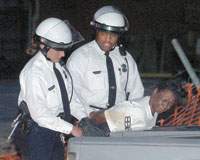Feature:
Cincinnati
Marching
Boldly
Backward
With
New
Marijuana
Ordinance
3/17/06
The Cincinnati city council is on the verge of passing an ordinance that would recriminalize marijuana possession in the conservative Ohio River city, despite the lack of any public outcry or signs of support for it. Under Ohio state law, possession of up to 100 grams (nearly a quarter-pound) of marijuana has been decriminalized since the 1970s, with those caught subject only to ticketing and a maximum $100 fine.
The ordinance is sponsored by self-professed crime-fighting Councilman Cecil Thomas, who heads the council's Law & Safety committee and who argued it would reduce the violent crime rate. "The most important aspect of this is it gives officers an additional tool for search and seizure," he said Tuesday. At the committee meeting, 12 people spoke out against the ordinance -- and more were lined up to do so -- while the only one who spoke in favor was Councilman Thomas, a former Cincinnati police officer. Among those speaking against the measure were medical marijuana patients like Tanya Davis of the Ohio Patient Network, Libertarian Party activist Paul Green, Cincinnati State University SSDP member Todd Roy, cannabis activist Lynne Wilson of Hemp Rock Productions, and Mason Tvert, head of Safer Alternatives for Enjoyable Recreation (SAFER), the Colorado-based organization that took a marijuana legalization initiative to surprise victory in Denver last November. "Marijuana users do not commit crimes, other than using marijuana," Tvert told the committee. Tougher marijuana laws would encourage more drinking, he warned. "Marijuana users do not engage in violent behavior, unlike alcohol users," Tvert said. "There were perhaps a hundred people in the chamber for unrelated council business, and our speakers got recognition and applause from that crowd," said Rob Ryan, former head of the Ohio Patients Network and current regional director of Republicans for Compassionate Access. "When Councilman Thomas spoke, it was the sound of one hand clapping. People know this war on drugs does not work and is actually counterproductive," Ryan said. But that begs the question of why, given loud public opposition to the ordinance and no support for it, the committee voted to approve it and why a majority of council members have said they would vote for it. A similar effort by Thomas's predecessor as chair of the Law & Safety committee, David Pepper, was roundly defeated last August. "That wasn't only shot out of the air," said Ryan, "it went down in flames. The difference now is that we have a new, inexperienced council and a strong ex-cop who is pushing this. The new council members are bowing to Thomas's will," he said. But Cincinnati is also a fundamentally conservative city, nationally known for persecuting Larry Flynt, banning Robert Mapplethorpe's homoerotic art, and for the tensions between its predominantly white police department and its black population, especially in the inner city Over-the-Rhine neighborhood. Police harassment of the area's residents as part of drug law enforcement efforts led to rioting in 2001. The only member of the council to oppose the ordinance, Vice Mayor Jim Tarbell, cited those sorts of race and class issues in rejecting it. "This will not change anything appreciably," Tarbell said. "This is a class issue. The people caught and prosecuted will be low-income African-Americans. I think this sends the wrong message to police." When Tarbell's opposition threatened to scotch the deal, the ordinance was saved in a compromise brokered by Councilman Jeff Berding, who suggested the sunset clause requiring the city to report in six months and one year on the measure's impact. "By placing a one-year sunset clause, we're forcing this council to analyze the information," Berding said. "Then we can decide with a lot of knowledge if it's effective. But the way to study it is to implement it for one year. I think that's good public policy." While that's better than a permanent change for the worse, it's not good enough for Cincinnati activists. "We're still fighting to kill the whole thing," said Ryan. Those activists have a only a few days to change minds, with the council meeting next week to vote on the ordinance. The vote should have happened Wednesday, but Mayor Mark Malloy asked for a delay after being persuaded by the group. "This is an emergency ordinance and should have been voted on Wednesday, but Mayor Malloy said uh-uh" said Ryan. "They had been watching the committee meeting on closed circuit TV, and after it got over, the group of people who testified went down to his office and asked for and got a meeting. He heard what we had to say and agreed to postpone it for a week. The postponement could give opponents a chance to undo what looks like a done deal. "It gives people a chance to rally and speak up," said Ryan. The clock is ticking. By this time next week, either the activists and good citizens of Cincinnati will have prevailed on their elected leaders to see the light, or the city will have taken a brave step forward to the 20th Century.
|

